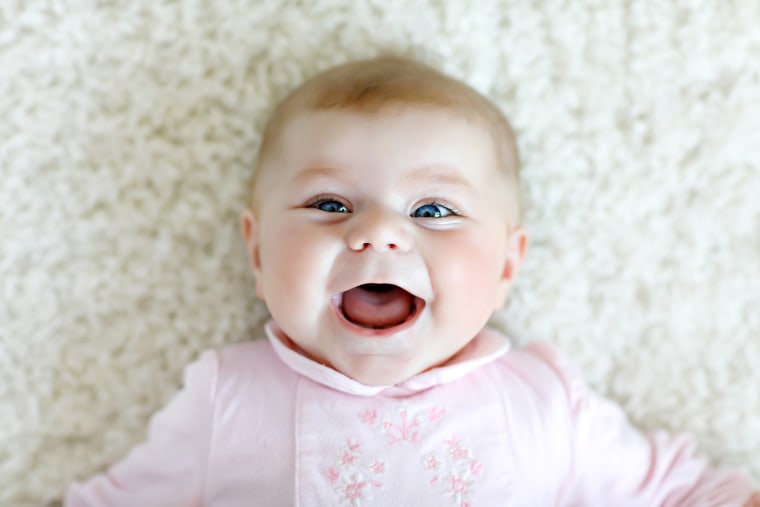As a parent of a newborn, much of your time is spent feeding, soothing and changing diapers. It may initially feel like a thankless job, but that changes when you see that first gummy smile appear. Here are the key facts about what is arguably one of the most joyful baby "firsts."
WHEN DO BABIES SMILE?
"Smiling is an important part of social development, and typically babies develop a social smile between 6 and 12 weeks, says pediatrician Wanda Abreu, director of the newborn nursery at New York-Presbyterian Morgan Stanley Children's Hospital. Like all child development milestones, there is a spectrum and every baby will reach it at their own pace. "What I always say is that babies do not read textbooks and they don't read what the American Academy of Pediatrics says — they do what they're going to do," Abreu says.
Although you may see your little one's mouth curve upwards from an even younger age (being gassy can trigger it), Abreu points out that these expressions are reflexive, as opposed to a true social smile, which occurs as a direct response, usually to a parent or close caregiver at first. "Some babies will smile even when they're asleep at like two weeks, you'll see the little corner of their mouth curve up and it's almost like a smirk. So that's a movement and you're seeing the muscles work, but it's not a social smile where you're getting feedback and emotion from them," she says.
Good news if you're a mom: Baby will be drawn to you at first. "They will prefer the mother's face at the beginning, and then in general female faces," she says. Like cooing and babbling, smiling is an early, pre-verbal form of communication a baby will use to get your attention.
WHAT MILESTONES COME BEFORE SMILING?
Before your baby starts to smile, you'll see her watching you and making brief periods of eye contact as her eyes become more coordinated and able to work together. "You'll see them starting to track the parent with their eyes, so in the first two months, they can look at you and just look from one side to the middle, but by two months they'll be able to cross the midline and go back and forth, because of their coordinated head and eye movement," she says.

HOW TO HELP YOUR BABY SMILE
Luckily, the best way to encourage your baby to start smiling is by doing what you're likely already doing: Engaging with them. Abreu says that it's not enough for babies to watch their parents smiling at, say, a funny dog video. "It's not just any interaction, like seeing you smile, it's seeing you smile at them. So when you engage them and have that direct eye contact, and then you smile, they mirror back your expression," she says.
Another trick you can try is to place a baby-safe mirror on their playmat during tummy time. At first baby will simply be entertained just looking at his reflection, but as he gets older it will inspire a natural smile. "Babies tend to like to see other babies' faces, so if they smile and smile back to themselves, it will keep them engaged longer," she says.
WHAT TO DO IF BABY ISN'T SMILING
According to Abreu, around 8 weeks babies are typically smiling in response to the sound of their mother's voice, and babies tend to smile back at others by 12 weeks. Infants are usually seen for well visits at the two-month and four-month marks, but if you have concerns in between, you should always call your pediatrician. "We'll ask, are there other concerning things regarding their development that they're falling behind on, such as social, motor or language delays? We'll go over family history as well and probe more to see if this is just a late bloomer, or if it's an early sign of something else, such as being at risk for an autism spectrum disorder," she says.
That said, Abreu also encourages parents not to get overly worried, especially if they haven't discussed their child's situation with the doctor yet. "I'm a mother myself and I know that my own tendency is to panic and assume that something is wrong, but I would just tell people to see their pediatrician and discuss these concerns. It's good to do your own research but then also use that along with the expert consultation," she says.

